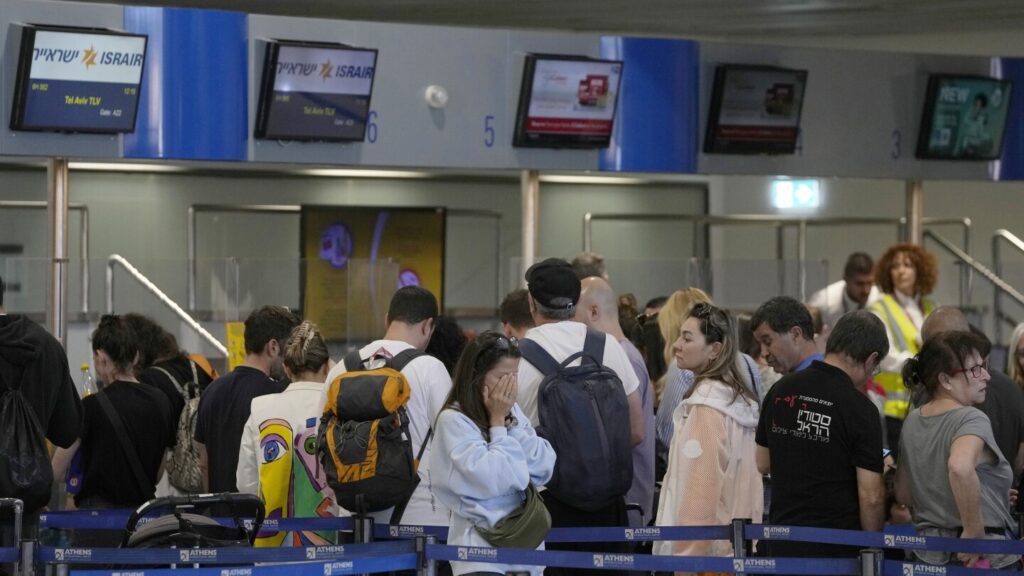
At the most harrowing of times, some Israeli citizens living overseas aren’t running from the war at home, but to it. From Athens to New York, they’re rushing to airports and diving into online chat groups for help, desperate to make their way to the country after Hamas militants attacked.
Some of these Israelis abroad are yearning to serve, whether that means fighting in a military reserve unit or volunteering to shuttle supplies to those in need, even as the war has already claimed at least 1,800 lives and shows no signs of abating. On Tuesday, Israel’s military expanded its mobilization of reservists to 360,000, according to the country’s media, as it ramped up its retaliation for the surprise attacks.
Yaakov Swisa, a 42-year-old father of five, said nobody called and asked him to return to Israel to fight, but he feels he has no choice. He served for 15 years, and he said he learned his army roommate was among at least 260 killed at a music festival.
Swisa wants to rejoin his reserve unit, even if that means leaving his family and his construction-business job in Los Angeles.
“I’ve been crying for two, three days. Enough. That’s it. I am ready to fight,” he said. “What else would I do … while my friends are being buried in Israel?”
In other cases, Israelis who are too young to serve in the military, as well as non-Israelis with close ties to the country, have been trying to travel to assist family members or volunteer.
Adam Jacobs, an 18-year-old community college student in New Jersey, said he was born and raised in the U.S. and for years traveled every summer to visit family in Israel. He said he learned his cousin was among those killed, and he wants to make his way to Israel to take on volunteer work, possibly shuttling supplies.
“I couldn’t live with myself if I stayed here,” Jacobs said. “It’s never been this bad.”
Eric Fingerhut, a former U.S. congressman who now leads The Jewish Federations of North America, said he’s not surprised by how many people want to help.
“As soon as we can possibly enable that, we certainly will,” he said from Tel Aviv, where he’d arrived just before the weekend attacks. “There are many Israeli reservists who are abroad. And so getting them back home to join the fight, you know, has been a priority. And it should be a priority. So people are just scrambling.”
The war began after Hamas militants stormed into Israel Saturday during a major Jewish holiday, killing people and abducting others. In response, Israeli warplanes have hammered the Gaza Strip, destroying buildings and sending Palestinian residents scrambling to find safety in the tiny, sealed-off territory.
Travel has been challenging, with major airlines suspending flights in and out of Israel. The U.S. State Department issued travel advisories for the region. Some reservists in the United States, home to more than 140,000 people born in Israel, were trying to get on charter flights.
Ofer Cohen, a New York businessman, said he learned there were more than 200 reservists traveling through South America on vacation at the time of the attacks. They’ve been called back to base but unable to get there, thanks to canceled flights. So Cohen is trying to cobble together hundreds of thousands of dollars to hire a plane to pick them up, as WhatsApp messages describing their troubles keep rolling in.
“I just saw one after another,” he said, “and I thought about this idea of getting a charter plane and get them back to Israel.”
In Greece, hundreds of people waited hours to board emergency flights at Athens International Airport, many without a ticket and most traveling from other European destinations after cutting holiday and work trips short. As officers patrolled the area to provide security, volunteers handed travelers apples, bananas and bottled water.
Nir Ekhouse, a 19-year old from near Nazareth, had been in the Maldives with family. They reached Athens via Istanbul as they tried to make it home. Once there, Ekhouse said, he plans to volunteer for an organization that supports the military.
“This is the first time in the history of Israel that something like that has happened. It’s very shocking,” he said, standing in line with his parents and younger siblings.
Israel Lawrence, 27, was born in Israel and grew up in London. He said that although he hasn’t been formally called up, he’s making the trip to join his fellow soldiers, many already on the front lines, and help his family members, who are living in terror and chaos.
“I want to be honest with you, I’m scared,” said Lawrence, a trained rifleman who was on his way to Israel via Cyprus. “All the guys I’m with are terrified, but we are trained, and we’ll do the best we can.”
__
Hadjicostis reported from Nicosia, Cyprus. Taxin reported from Santa Ana, California. Also contributing were: AP reporters Bobby Caina Calvan in New York, Lefteris Pitarakis and Derek Gatopoulos in Athens, John Leicester in Paris and Nicole Winfield and Patricia Thomas in Rome.




